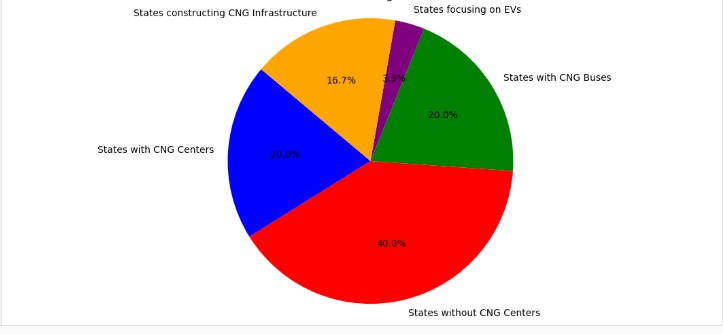Reports reveal that many regions in Nigeria still lack Compressed Natural Gas (CNG) conversion centres and refill stations. The states affected include Delta, Kwara, Jigawa, Adamawa, Plateau, Niger, Imo, Enugu, Akwa Ibom, Benue, Osun, and Borno. However, many of these states have expressed interest in joining the Federal Government’s CNG initiative, with Borno opting for Electric Vehicles (EVs) and tricycles instead.
A few months ago, the Federal Government distributed 64 CNG-powered buses to the FCT Administration as part of Nigeria’s 64th Independence Anniversary celebrations. Despite this, transporters such as Oladele Abiodun reported that only four CNG conversion/refill centres currently exist in the territory. He lamented the long queues at the few available stations, with some residents waiting over four hours to buy gas.
Osun State In Osun, the Commissioner for Information and Public Orientation, Kolapo Alimi, confirmed that the state has no CNG conversion or refill centre. He urged the Federal Government to honour its pledge to provide conversion centres and buses to alleviate transportation hardships in the state. While the state lacks these facilities, the government has provided the “Imole” buses for public transport.
Ogun State Ogun State took the lead in the CNG initiative by rolling out 17 buses on October 30, 2023. With three conversion centres operated by Nigeria Gas Transport Solution Ltd (NGTSL), Next Gen Ltd, and a facility on the Mowe-Ibafo corridor, Ogun also boasts three CNG refilling stations. So far, 31 vehicles have been converted using free kits provided by the Federal Government.
Oyo State Oyo State has received 20 CNG buses from the Federal Government and has commenced the first phase of free vehicle conversions in Ibadan. As of September 15, 70 vehicles have been converted to CNG. Still, the First Vice-Chairman of the Park Management System (PMS), Ademola Adeoye, noted that there were not enough conversion centres in the state, with only three recommended by the Federal Government.
Ekiti State Ekiti State has shown a strong commitment to the CNG initiative. The state has seven conversion centres, which power its independent power plant. The federal government has also provided 15 CNG buses to improve public transportation.
Enugu State Enugu is constructing a large CNG mother station that serves the entire Southeast region. The state is also planning to establish ancillary daughter stations, and private firms are already training technicians to convert vehicles to CNG. The state’s government invests in CNG buses to promote affordable, eco-friendly transportation.
Rivers State Although some CNG-powered vehicles have been sent to Rivers by the Federal Government, no confirmation has been made regarding their deployment. The state plans to open two CNG refuelling stations and two conversion parks in Port Harcourt. Additionally, Portland Oil and Gas has opened a centre for vehicle conversion at the Onne Oil and Gas Free Zone.
Ondo State Ondo is still developing its CNG infrastructure, with a plant 90% complete. The state’s 2025 budget includes provisions for purchasing CNG-powered vehicles, although it has yet to receive any from the Federal Government.
Kwara State Kwara recently received 20 CNG-powered vehicles from the Federal Government. While no conversion or refill centres exist, the state government is working to improve transportation through the CNG initiative.
Niger State Niger has yet to establish conversion or refill centres, but the state has procured 200 CNG buses. These buses are currently parked at the Trade Fair Complex in Minna. Governor Mohammed Bago’s administration has earmarked N10 billion to establish bus terminals and CNG stations across the state.
Plateau State Plateau faces a significant barrier to the CNG initiativen insufficient refill stations. The state is in discussions with Greenville Energy, which has constructed CNG stations in other states, to establish one in Plateau. However, the state has not received any CNG vehicles yet.
Imo State Imo is focused on leveraging its natural gas resources through a comprehensive CNG strategy that includes constructing three major CNG stations. The state plans to create jobs, reduce transportation costs, and grow its economy through the widespread adoption of CNG vehicles.
Akwa Ibom State Akwa Ibom has yet to decide whether to participate in the CNG initiative. Governor Umo Eno has expressed concerns over safety and the availability of refill stations, with the state currently focusing on ensuring adequate fuel availability.
Benue State Benue is still in the early stages of implementing the CNG initiative, with no conversion or refill centres yet established. Although the state has long expressed interest in CNG, it has not been part of the Federal Government’s pilot scheme.
Borno State has opted for Electric Vehicles (EVs) rather than CNG. The state government is investing in EV technology, including purchasing 30 electric vehicles and 500 electric tricycles and establishing charging terminals in Maiduguri and surrounding areas.
CNG INITIATIVE FOR NIGERIAN STATES

This chart shows the proportion of states in each category:
- States with CNG Conversion/Refill Centers: 6 states (24%)
- States without CNG Conversion/Refill Centers: 13 states (52%)
- States with CNG Buses from the Federal Government: 6 states (24%)
- States focusing on Electric Vehicles (EVs): 1 state (4%)
- States constructing CNG Infrastructure: 5 states (20%)
Key Insights:
- Infrastructure Gaps: Many states lack the necessary infrastructure to support the CNG initiative, leading to long wait times and limited access to CNG refuelling.
- Government Support: While some states have received CNG buses and conversion kits, others await promised support.
- Alternative Solutions: States like Borno are exploring EVs as an alternative to CNG due to infrastructure challenges.
The report highlights the varied progress across Nigeria in adopting CNG-powered vehicles. Some states are making strides, while others still face significant challenges in establishing the necessary infrastructure to support the initiative.